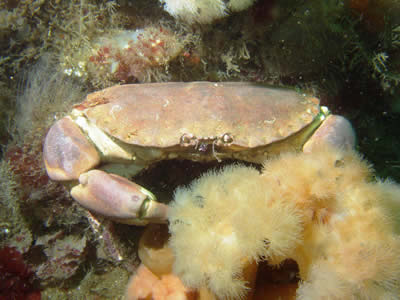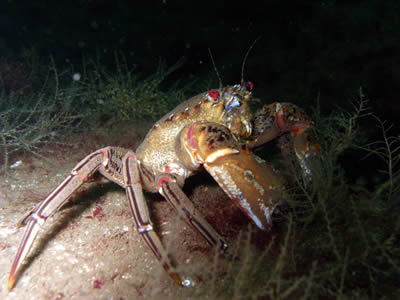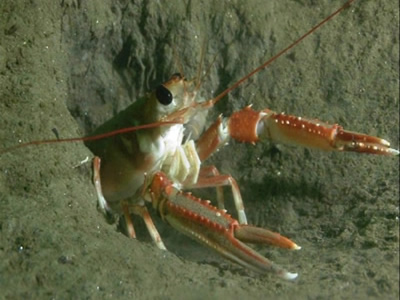Creel CatchThe inshore creel fishing sector focuses mainly on
the following target species. Prawns are currently the most valuable species to
the Scottish economy.
Lobster Homarus gammarus

Value – £9.7 million in 2011
Lobsters live on rocky substrate, normally to around 60m in depth. The
lobster fishery has been in existence for hundreds of years. Ancient lobster
‘ponds’ can be found around some of the Scottish coast, a good example can be
seen at
Bernera on Lewis. These ponds were built using submerged dykes in tidal
lagoons to enable fishermen to keep their catch alive until it was time to sell.
Brown crab (or Edible crab) Cancer pagarus

Value - £6.2 million in 2011
Brown crab live on hard and soft ground. The brown crab fishery is
established but has been increasing rapidly over the past 30 years as
developments in technology have allowed off shore fisheries to become
established.
Velvet crab (or Swimming crab) Necora puber

Value - £4.6 million in 2011
The velvet crab is so called because of the velvet like texture of its shell. It
can swim freely through the water, but is normally found on rocky substrata. The
velvet crab fishery has been developed relatively recently to supply continental
markets as their own fisheries have been depleted. This is a seasonal fishery
with most landings occurring between July and November.
Prawn (or Norway lobster, Langoustine, Dublin Bay Prawn,
or Scampi) Nephrops norvegicus

Value - £42 million in 2011
Prawns live in U shaped burrows in soft sediment and are targeted by trawlers
and creel fishermen. Currently most creel caught prawns are exported and sold
alive. In comparison, most trawled prawns are ‘tailed’ and are sold into the
bulk scampi and paella market. As a result, creel caught live prawns can command
a much higher price than trawled prawns. SCFF believes this is a better way of
exploiting the fishery as fewer are caught but generate high revenues for
fishermen.
Fishing with creels ensures that shellfish caught are fresh and in pristine
condition; this allows creel fishermen to market a premium product that they can
be proud of.
For more information on the main shellfish species targeted see –
Scottish Sea Fisheries Statistics 2011
For any queries regarding the SCFF or information on how to join please
Contact Us
| 
